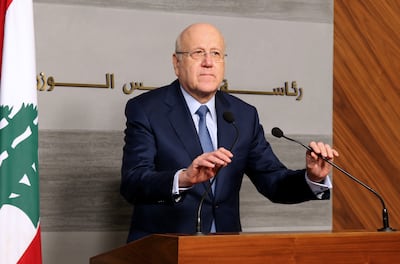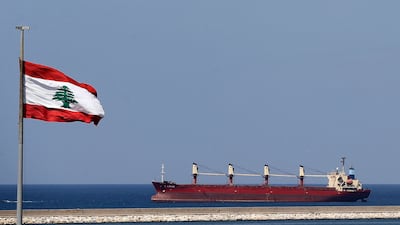Lebanon resumed talks with the International Monetary Fund that had stalled for a year and a half because of political differences in the country after it approached the lender for a $10-billion programme.
The government "expressed its willingness to progress towards reaching an agreement on an appropriate recovery programme that could be supported by the institution and harness broad support from the international financial community", the Finance Ministry said on Monday.
The newly formed cabinet, led by Prime Minister Najib Mikati, "is fully conscious of the urgency of Lebanon’s social and economic situation and of the challenges lying ahead," the ministry said in an emailed statement.
"The government has repeated its commitment to resume discussions with the IMF as early as possible and formed the team in charge of negotiating with the fund."
The team is led by Deputy Prime Minister Saade Chami and includes Finance Minister Youssef El Khalil, Economy and Trade Minister Amin Salam, and Banque du Liban Governor Riad Salameh.
Lebanon defaulted on about $31bn of eurobonds in 2020 and is enduring its worst financial crisis in three decades. Its currency has lost more than 90 per cent of its value against the US dollar, leading to surging inflation, increased unemployment and poverty.
Inflation soared to an annual 123 per cent in July, while gross public debt increased an annual 5.4 per cent to $98.2bn at the end of May 2021, from the same month a year earlier.

“An IMF-supported programme is essential to put the country on a path towards recovery," Mr El Khalil said after being appointed as Finance Minister in September.
"A funding agreement will ensure that the recovery is associated with the implementation of necessary and long overdue reforms and will help restore confidence in our economy.”
Lebanon approached the IMF in May 2020 for a bailout package, but talks stalled because of systemic delays in forming a government and disagreements among the country's political factions on sharing of power.
"The government remains fully committed to engaging in a constructive, transparent and equitable debt restructuring process with all other stakeholders, and welcomes the interest of bondholders, including the 'Ad Hoc Lebanon Bondholder Group', to participate in this process," the Finance Ministry said.
"The government reiterates its commitment to a fair and comprehensive solution for all creditors and will engage, with the support of its financial and legal advisers, in good faith discussions with all its creditors as early as practicable," the ministry said.
Lebanon’s economic crisis ranks among the world’s top 10 crises – possibly even the top three – since the mid-19th century, the World Bank said in June.
The magnitude of the economic depression has "no clear turning point" on the horizon, given the "disastrous" and deliberate policy inaction, the Washington lender said.
Lebanon's economy fell to an estimated $33bn in 2020, from nearly $55bn in 2018. The economy shrank by 20.3 per cent last year, after a 6.7 per cent contraction the year before, according to the World Bank.
A report by the lender last year said the country was in a "deliberate depression" because of the political paralysis and a failure by policymakers to reach an agreement on a new government and the necessary reforms that could unlock $10bn of aid from the IMF and another $11bn from international donors.


